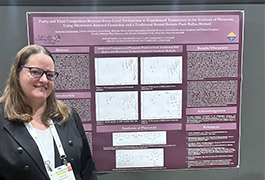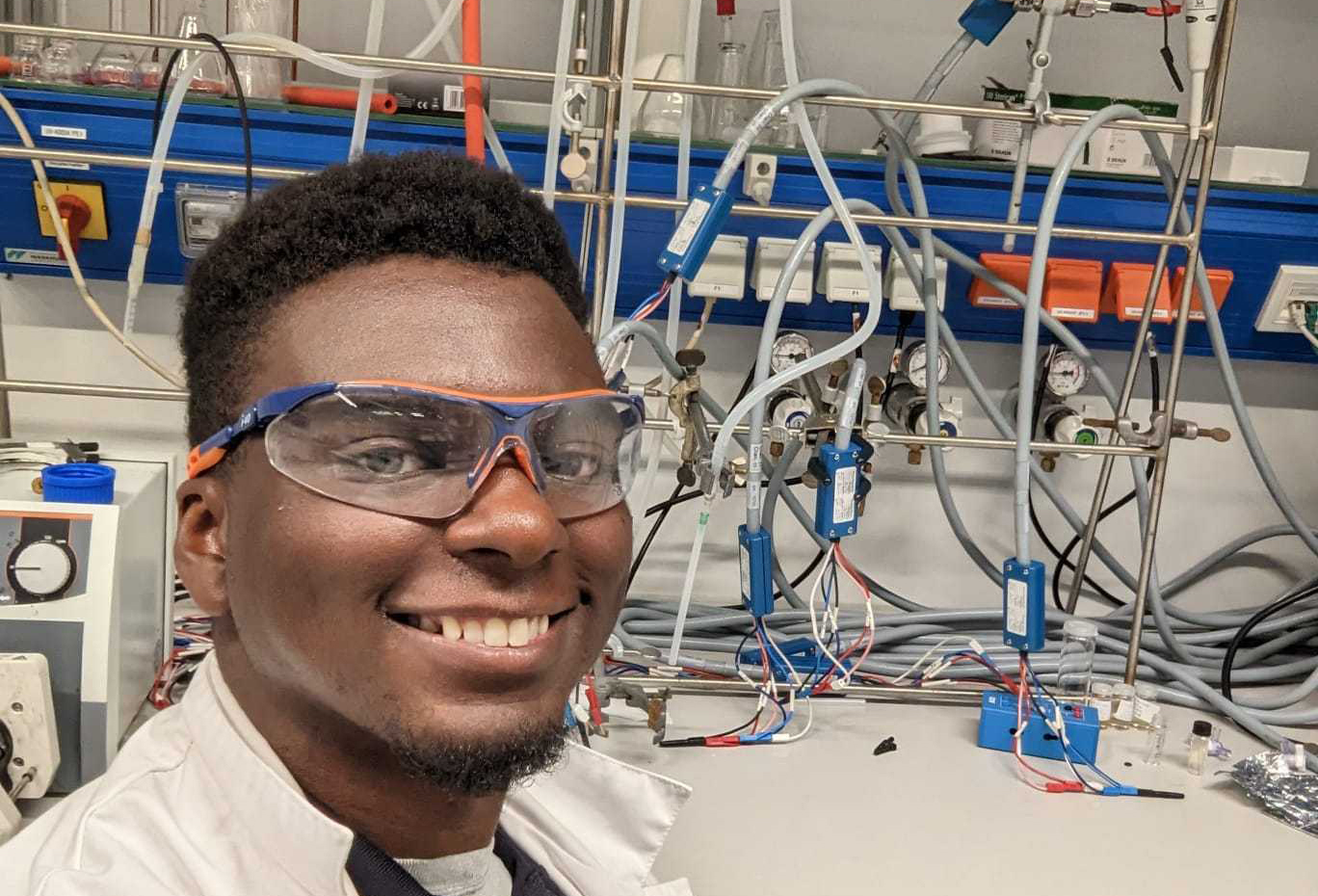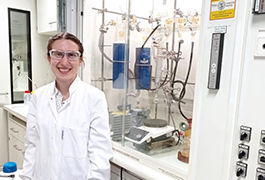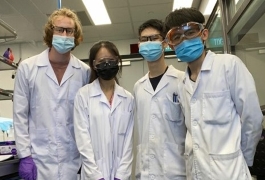Students Say Doing Research in Germany and Singapore Made Them Better Scientists
In the ACS International Research Experiences for Students (IRES) program, a summer research program that gives undergraduate students an opportunity to do research in Singapore and Germany, scholars grow as individuals and as scientists. The following fellows share exactly how their experiences transformed their scientific skills.
Broadening horizons by building community
Fellow: | Jonathan Clark |
Projected graduation date: | May 25, 2025 |
Home institution: | Oberlin College and Conservatory in Oberlin, Ohio |
Host institution: | Universität Paderborn in North Rhine-Westphalia, Germany |
Research focus: | Synthetic techniques for proton-conducting silica materials to make efficient hydrogen fuel cells |
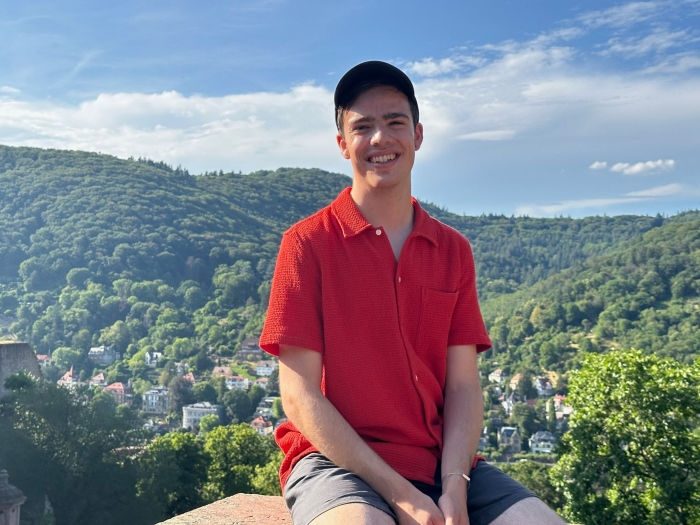
At an undergraduate-only institution like Oberlin, research for me normally means coming in 2-3 times a week for 2- or 3-hour blocks. I head to the fume hood next to the window, set up some crystal solutions, run a PXRD [powder X-ray diffraction] sample or two, and analyze data if there is time. I then leave to run to a rehearsal or chip away at some problem set that’s due alarmingly soon.
This routine was flipped on its head last summer. IRES provided me an opportunity to spend forty hours a week sitting and growing with a project, along with the people connected to it. I had never before worked exclusively on research for 10-plus weeks, nor stepped out of the country for more than a week or two. My friends in the lab, when we weren’t hanging out in the break room or celebrating a birthday with Kaffee und Kuchen (a German tradition of Coffee and Cake), were teaching me myriad new techniques and concepts in chemistry.
While I have carried an interest in porous materials and nanoscience for years, I hadn’t found a setting for learning about the topic until this IRES research opportunity. My mentor, Tobias, along with colleagues like Marvin and Zhenyu, patiently explained the structure and theory of mesoporous materials like the MCM-41 we were making. Micelle behavior and silica synthesis were wholly new topics to me, and my lab mates at Paderborn were generous with the knowledge they shared.
More granularly, I was led through the theory, sample prep, and data analysis of N2-Physisorption and impedence measurements to quantify our pore dimensions and proton conductivity, respectively. I also developed fluency in techniques that I was merely introduced to in America, like operating a Schleck line. The Tiemann lab’s supportive and investigative culture was cornerstone to my learning new concepts and skills like these.
My experience in Paderborn opened my eyes to the fruits that arise from a balanced, friendly work culture. Each day, we would walk to the Mensa (cafeteria) together to have lunch. We would also congregate in the breakroom a couple times each day to enjoy coffee as a lab group and sit around solving Rubik’s cubes. This cubing culture was an unexpected dimension of my summer experience, but I embraced it wholeheartedly and dove right in. I was able to beat my advisor a few times towards the end of the summer in cubing races (I was averaging about 35s), but poetically, he beat me in our last race of the summer (rematch to come!).
The lab also had regular outings and celebrations. I ran my first 5k race with lab mates and played a backyard game “Kubb” at a chemistry department barbeque. Seeing a game I only knew from childhood hometown of Lexington, MA, played at a science barbecue across the Atlantic, struck a nerve regarding the common grounds we can find outside of our home country. All these activities fortified comradery in the lab and led to regular conversation and exchange of ideas that improved our research.
Across the summer, I learned lessons ranging from how to read an isotherm to the importance of community and bonding within a lab. I am deeply excited to continue forward watching how this knowledge serves my life at Oberlin and beyond, and will always look back fondly on my precious time in Paderborn, Germany.
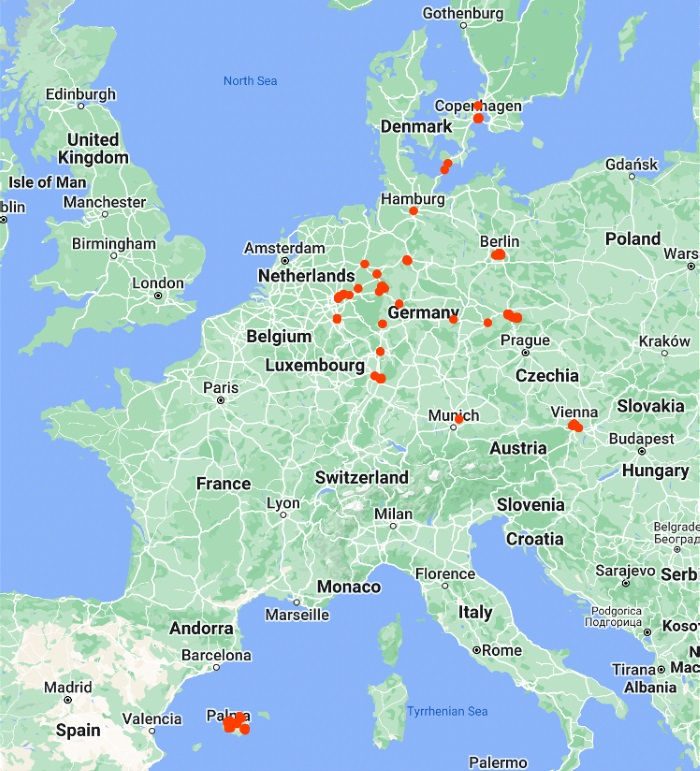
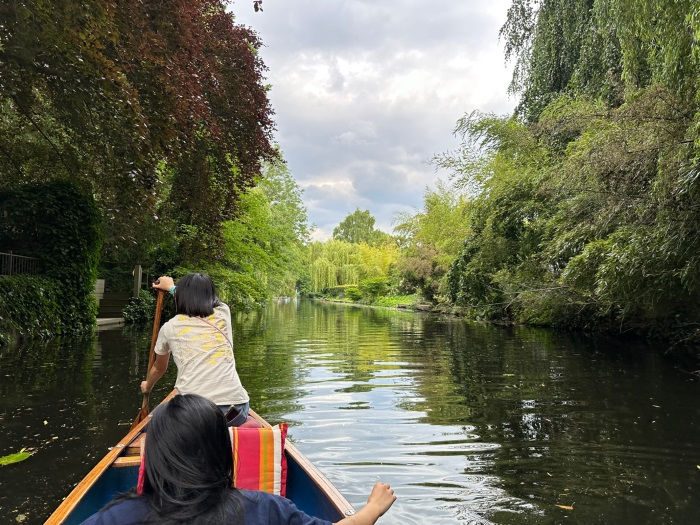
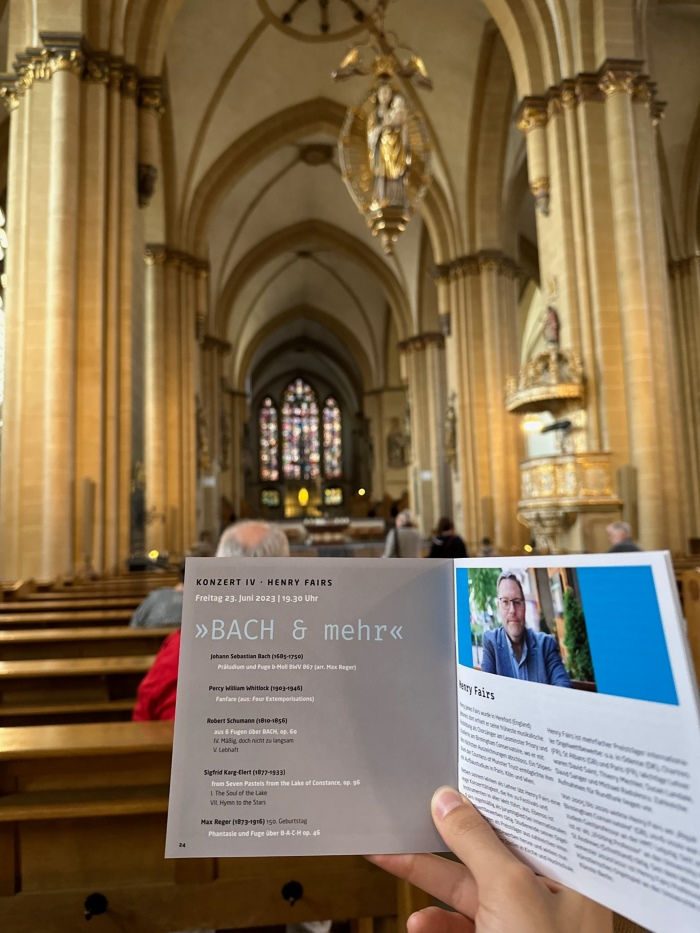
Meeting students from around the world in Germany
Fellow: | Elena Chen |
Projected graduation date: | May 2024 |
Home institution: | Cornell University in Ithaca, New York |
Host institution: | Karlsruhe Institute of Technology in Karlsruhe, Germany |
Research focus: | Development of photocatalytic systems that catalyze CO2 reduction |
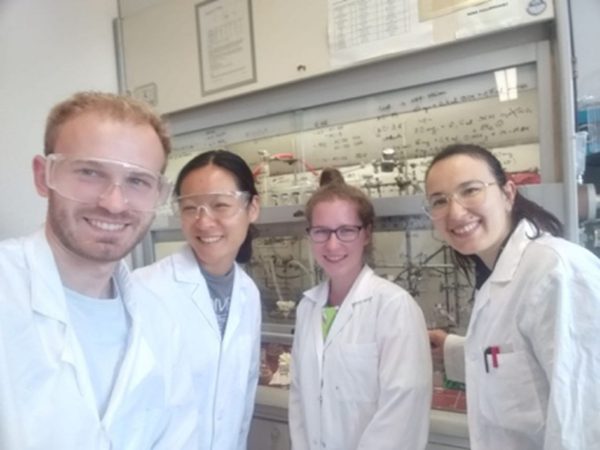
When traveling to Karlsruhe, Germany, to conduct research, I had no idea what to expect from the students I would meet or the researchers in the lab. My group was a smaller, independent research group of 5 people under a larger group of about 50 people.
I really enjoyed being able to get close with the people in my group and work, work directly with the independent group leader, and spend a lot of time working alongside fellow researchers. Through my interactions, I was learned a lot more about the German higher education system, from a bachelor’s degree to master’s to a PhD.
I met students from Poland, China, Italy, and Luxembourg. It was comforting to see that I was not the only student not native to Germany, and because the working language was English, I did not have problems with communications. Granted, there were some translation issues, from chemical names to specific glassware, but it was incredibly beneficial to my scientific communication skills to be able to work with a large, diverse group of scientists and learn about the research they were conducting .
Getting accustomed to a different daily schedule took some time. From going out to lunch at 11 a.m. everyday (it was a chemistry department thing, apparently) to having a coffee break at 2 p.m., the work-life balance of having several breaks within the day and allowing time to discuss our research woes was incredibly rejuvenating. We bonded over our passion for research while also building connections outside of the lab.
I also loved my living situation. I lived in a student-run dormitory among a community of other dormitories, which is uncommon in Germany. This allowed me to meet many students all in one place, and I became really close with the residents on my floor.
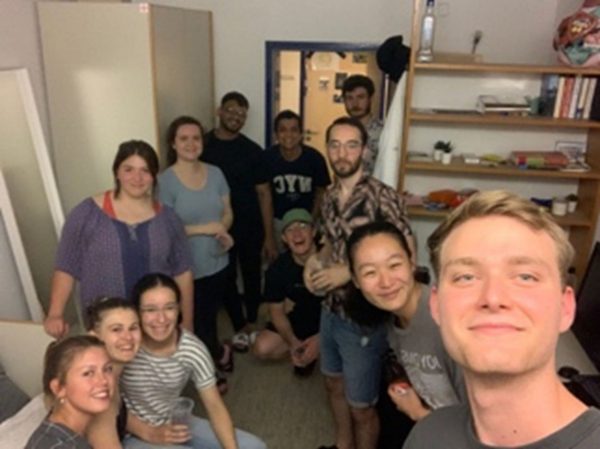
Even more exciting was being able to make friends with the people of Germany doing activities together. We went to a nearby man-made lake to swim to dormitory events! This included what they called a “parking lot festival” where each floor hosted a booth selling food or drinks, and a Tour de Chambre where our entire floor got together and visited everyone’s room to try a drink or snack that we each made.
This integration within the German student community was incredibly important to me, as was learning the culture and meeting such a vast number of students. I loved just being able to chill with them, watch Formula 1 races together, or discuss the differences between living in the US and Germany.
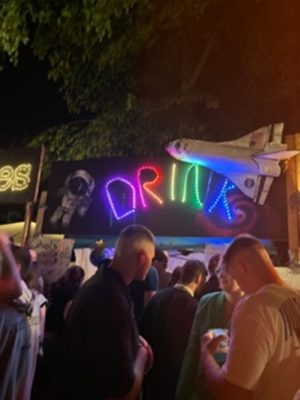
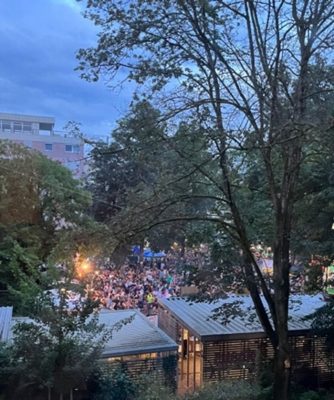
Building confidence on the fly
Fellow: | Conor Reid-Tedesco |
Projected graduation date: | May 2024 |
Home institution: | Colorado School of Mines in Golden, Colorado |
Host institution: | National University of Singapore |
Research focus: | Effects of nanoplastics on the renal cell line 786-O |
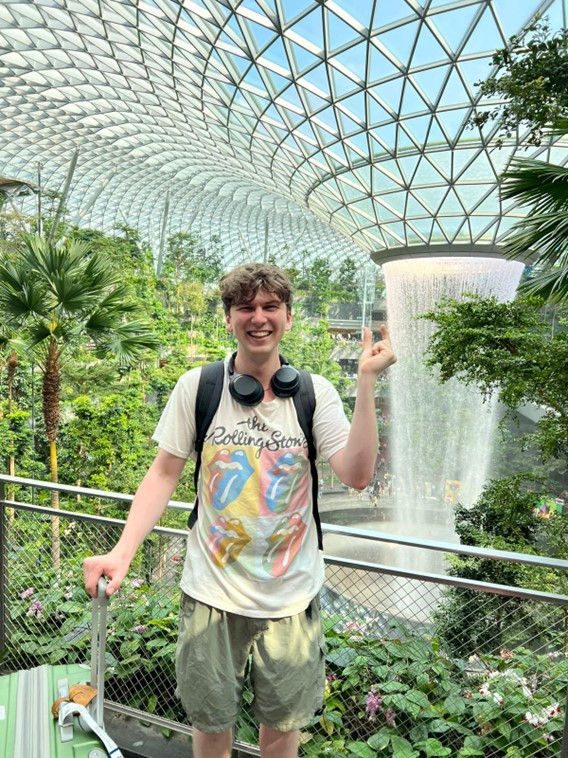
I didn’t really understand the gravity of the fact that I would be spending 10 weeks in Singapore until several days after our plane landed at Jewel Changi airport. After my first meeting with my PI, however, the truth began to settle in. I was given the opportunity to work on a project with a biological focus, something I had never been exposed to in my prior experiences doing organic and inorganic synthesis work.
I was admittedly anxious, of course, but I decided I would work on this project to the best of my ability. The first few weeks were nothing challenging – the project began with synthesis, an area I felt comfortable in. However, we soon moved into the cell culture labs, and I was exposed to numerous procedures I had never encountered before. I was lucky to have the guidance of a graduate student for the first few weeks, which bolstered my confidence in performing unfamiliar procedures.
Within just one week of starting the cell culture work, my graduate student mentor trusted me to work without her supervision. In a foreign environment, I felt scared apprehensive about my capability to accurately complete my procedure. This fear was amplified towards the end of the project w hen I had to perform cell imaging. Unfortunately, my graduate mentor was not present on the day of this experiment, and I had never attempted this procedure. With only information I had from a short phone call and hastily scribbled notes in a small pocket notebook, I was left to complete the work. I was terrified.
Yet, things did not go as poorly as I expected! Perhaps this experience was necessary to help me overcome my self-doubt and fear of working alone in a new environment. I learned something important during those ten weeks: It is difficult to expand your skillset and confidence in research without direct exposure. Taking the plunge into independent work was what I needed to further myself as a researcher, and I am glad I chose to work on that project. In fact, I enjoyed my experience so greatly that it has impacted my plans for involvement in research in the future. I am currently seeking positions in labs based in biochemistry rather than a pure chemistry focus.
Pretzels and research
Fellow: | Quentin Smith |
Projected graduation date: | May 2025 |
Home institution: | Virginia Tech in Blacksburg, Virginia |
Host institution: | Heinrich Heine University Düsseldorf in North Rhine-Westphalia, Germany |
Research focus: | Novel synthesis techniques of metal-organic framework water oxidation catalysts |
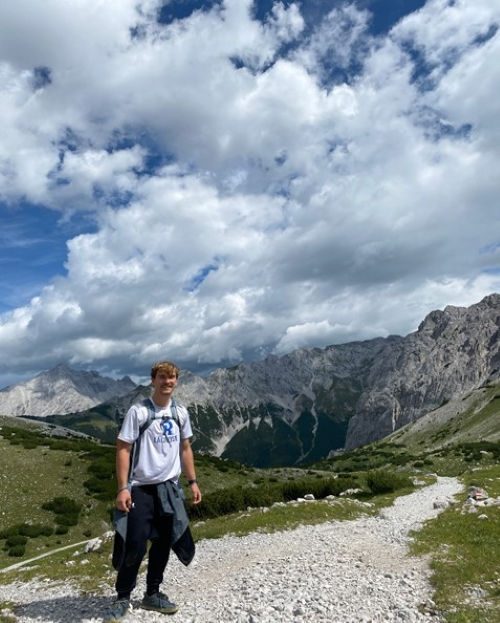
I left the US with one major goal in mind: To find the best Bavarian Pretzel in Germany. I can say with 99% certainty that I managed to achieve that goal. In Tegernsee I stumbled on a restaurant called Bräustüberl where I found a pretzel that balanced the three main elements of a perfect pretzel: a perfect crunch, a chewy but airy interior, and the perfect salt ratio. My experience in Germany amounted to a lot more than just a wonderful pretzel.
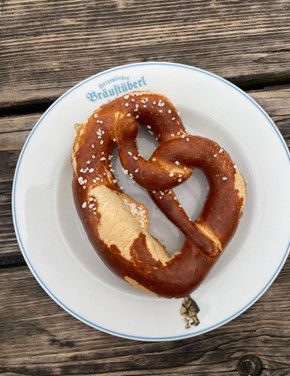
In my 11 weeks in Germany, I not only got to live in and experience another culture, I gained an immense amount of laboratory experience amongst passionate and brilliant lab members. I began this experience unsure of my plans down the road pertaining to graduate school. Now, I am heavily considering graduate school, and thinking about attending in a country outside the US.
During my time in the lab, I performed research into novel synthetic techniques of metal organic frameworks (MOFs) and their application for water oxidation catalysis. Water oxidation is an important process for the future of clean and renewable energy. The formation of hydrogen in this process can be used as a clean- and high-energy combustion source for future cars and general energy use.
Now that was a lot of jargon so let me break it down. Essentially, many current techniques for the creation of water oxidation catalysis are too expensive or take too much time to be feasible in the large scale. We investigated the process of mechanochemistry (the synthesis of various molecules through mechanical forces) and its potential application in generating complex bimetallic MOFs. In my case, this involved creating these catalysts with both copper and ruthenium nodes. The incorporation of ruthenium allowed for the increased catalytic efficiency of the MOF. I had previous experience with MOF research, however, every other aspect of this project had me learning on the fly, and that’s something I truly loved about this experience. The technical knowledge I gained in this time will undoubtedly help me in my future chemistry endeavors.
To be immersed in a new lab of any kind is bound to offer a lot of new knowledge. I found that in addition to being in a new lab, working with individuals who were raised in a culture different from my own offered a new perspective on problem-solving that I found fascinating. I am extremely grateful for the hospitality and knowledge that I gained from the Janiak group at the University of Düsseldorf and hope to apply these skills to my studies in the future.
My time wasn’t all pretzels and research though. My weekends consisted of experiencing as many aspects of the culture as I could and trying my absolute best to sleep on trains (I couldn’t). From the six countries I got to visit to the new people I was fortunate enough to meet in those journeys, I can say for sure that my 11 weeks were an incredible experience.
For those considering going abroad for any reason, I HIGHLY recommend it. Diving head-first into finding my way in a completely different country taught me how to live independently. More importantly, it taught me just how much I can learn from other cultures and how beautiful and diverse the world is.
Learning a whole new field
Fellow: | Gabriel Streblow |
Projected graduation date: | June 15, 2024 |
Home institution: | Eastern Oregon University in La Grande, Oregon |
Host institution: | Helmholtz Institute Freiberg for Resource Technology in Freiberg, Germany |
Research focus: | Using ion exchange techniques to recover lithium from process water |
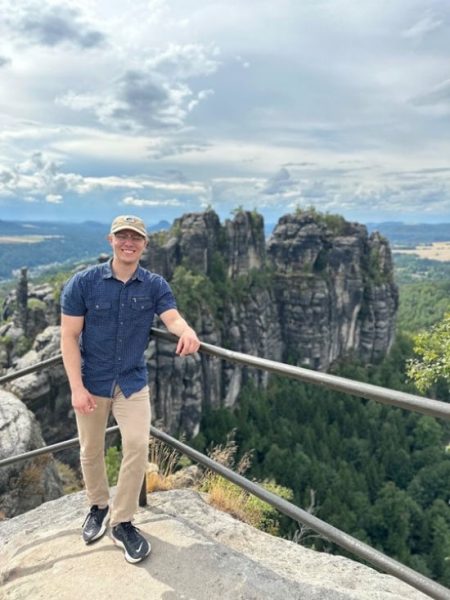
Doing research with my group in Germany was far different than the research I have done at Eastern Oregon University (EOU). EOU is a primarily undergraduate research institution, so research is led by professors. Helmholtz Institute Freiberg for Resource Technology (HIF) had department heads, post docs, graduate students—just to name a few of the positions there. Having this big change of who to talk to for guidance was challenging at first. Normally when conducting research, I talk to my professor about what steps we should take in the research process. But with such a large hierarchy at HIF, I had way more options for who to ask when looking for guidance.
At HIF, I learned how the industry side of science is conducted, specifically in the engineering field where they specialize. As a chemistry major, I had little-to-no knowledge of basic concepts that are common in that field. So, on top of trying to learn German, I also had to learn about the chemical engineering field. This seemed like a daunting task at first, but after the first few weeks, I had gotten my feet under me and progressed in the research process.
As soon as I thought I was getting the hang of everything, my advisor wisely wanted me to start learning how to process data from the experiments I had been doing. This was very hard for me. Without a background in engineering, I was having trouble trying to figure out what she wanted me to quantify in the research I had been doing.
Towards the end of my time at HIF, I finally was putting together what the industry field is looking for when conducting research that will help me greatly in the future no matter which direction of research I go into.

